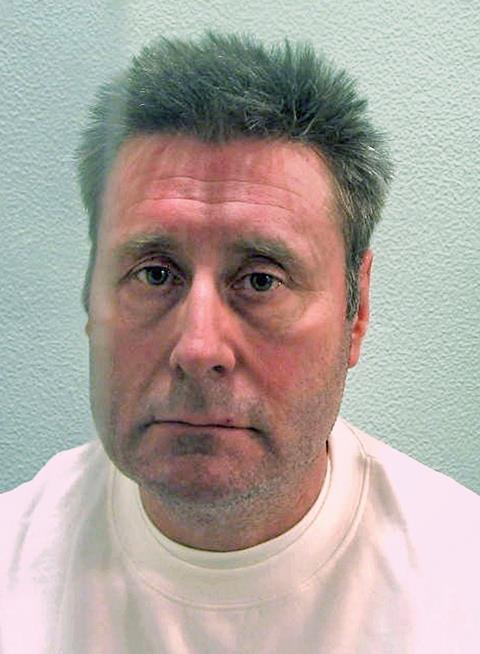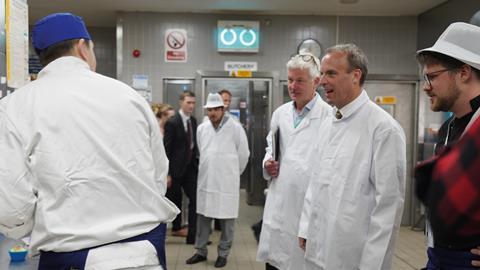Prison lawyers are sceptical about the latest reforms of prisons and probation, reports Rachel Rothwell. At Westminster debate on penal policy long ago degenerated into a competition over who can shout the loudest about crime
The low down
Plans for reform of the parole rules will see bold new powers for the justice secretary to veto the release of serious offenders. But lawyers question the legal basis of the new powers and argue that decisions will be based on the notoriety of the offender rather than public safety. Meanwhile a suite of reforms is also planned for the prison sector. The government has committed £4bn to create 20,000 new prison places. But an ever-expanding prison population means that the biggest problem facing the system – overcrowding – will remain. This puts pressure on resources and will make it hard for the government to fulfil its promises on education and rehabilitation.
‘Black cab rapist’ John Worboys is one of the UK’s most notorious sex offenders. As such he sparked public outrage in January 2018 when the Parole Board directed he be released on licence, having spent only 10 years behind bars for offences against 12 women.
The board’s decision, which did not consider offences against many other women for which Worboys was not prosecuted, was ultimately quashed by the High Court. But it served as a catalyst for reform of the Parole Board Rules in 2019, creating a new mechanism for appealing against board decisions; a duty for the board to include evidence relating to offences for which the individual has not been convicted; and a limited role for victims in the parole process.
Now further reform of the parole rules is on the cards, set out in the government’s ‘root and branch review’ of the system published in March this year. Meanwhile change is also afoot for the prisons sector, with a white paper on prisons strategy published last December.
Power struggle
The centrepiece of the latest parole reforms is a new power for justice secretary Dominic Raab to override independent experts on the board and to personally decide if ‘top tier’ prisoners should be released once their minimum term has expired. These prisoners will have committed the most serious offences of murder, rape, terrorism, or causing or allowing the death of a child. The government has not said how many parole decisions it will review each year, but the Prison Reform Trust (PRT) estimates that as many as 700 will fall within scope.
The new power has angered many criminal justice experts. Peter Dawson, PRT director and a former prison governor, says: ‘The principle is really concerning because it’s about the liberty of the individual, and that belongs with a court, or a court-like body – which the Parole Board is – which is independent of the executive.’
Dawson points out that the Parole Board only gets involved when the period set for punishment by the court has expired. So it is only ever deciding whether it is safe to release someone, not whether they have been punished enough.
'When it comes to parole decisions, punishment should not be on the table. Yet what ministers are proposing is not driven by public protection – it’s driven by public outrage'
Peter Dawson, Prison Reform Trust
‘Nobody says the secretary of state should be sitting at the judge’s shoulder at the trial, saying whether the punishment is severe enough,’ says Dawson. ‘The attorney general can refer cases back to the Court of Appeal if a sentence is considered unduly lenient – that power has been used a great deal, and is one of the things that has driven up sentence lengths very significantly over the past 15 to 20 years. But when it comes to parole decisions, punishment should not be on the table. Yet what ministers are proposing is not driven by public protection – it’s driven by public outrage. And public outrage is about punishment, not the likelihood of reoffending.’
Dawson adds that the new test that ministers will apply in deciding whether a prisoner should be released essentially centres upon ‘public confidence’; which will ultimately be influenced by how ‘notorious’ the offender is.
‘Notoriety doesn’t actually come down to the relative seriousness of the offence committed,’ he warns. ‘It can be driven by press coverage at the time or subsequently; it can be driven by the views of victims… Media coverage is completely random – it can depend on what is happening in the news that week as to whether a story hit the front pages; or the photo that appears of the perpetrator. You’ll often have photographs that are reproduced again and again, but are 25 years out of date.’
Dawson also points to the lack of evidence that there is any real problem to be solved. Despite the furore surrounding the Parole Board’s original decision on Worboys, its overall track record on release decisions for serious offenders is extremely good. Of the serious offenders who are granted parole by the board, only around 1% are recalled to prison because they have committed a serious offence. ‘Based on the statistics, the Parole Board is undoubtedly keeping plenty of people in prison whom it could safely have released, because it has a cautious approach,’ notes Dawson.
No serious offender is released to complete freedom. They remain under supervision, and the bar for being recalled to prison is very low: it could be for missing an appointment, associating with the wrong people, or partaking in drugs or alcohol – with new ‘tag’ technology available that can monitor alcohol levels in a person’s sweat.
Recipes for success: The Clink
A key plank of the government’s prisons strategy involves helping former prisoners find employment on release. In March, it committed to setting up employment advisory boards involving local employers in all 91 resettlement prisons, with 20 already in place.
The Ministry of Justice has championed rehabilitation charity The Clink as an example of how inmates can develop skills and qualifications that translate into solid employment on release. The Clink has 20 kitchens across the prison estate and runs four public restaurants sited in prisons, two of which sit inside the gates.

In The Clink’s Brixton restaurant, for example, customers reserve a table online and then arrive at The Clink’s reception area in the grounds of Brixton prison, where they must hand over their mobile phones. Clink staff then escort the customer into the fine dining restaurant where all the food is cooked and served by prisoners. The quirky venue has proved a hit with customers and is highly rated on Tripadvisor. ‘Our graduates work in Michelin-starred restaurants and hotels; or if they are serving a short sentence, they can also get a lesser qualification, and get a job as a barista,’ explains the charity’s chief executive Yvonne Thomas.
‘The kitchen has to be structured around the prison regime, but you can generally get in six hours’ work a day,’ she adds. ‘We expect trainees to adhere to exactly the same standard as in an external environment, so they have to dress properly, adhere to the rules, and they can get fired – and often do.’
Statistically, prisoners who have done a Clink programme are 70% less likely to reoffend. The project was hit hard by Covid, but more than half of its 400 training places are now filled again, with that number rising every week.
The Clink is primarily funded by charitable donations rather than public cash, but Thomas praises the practical support received from the MoJ. ‘The environment for programmes like ours is better than it’s ever been. It’s so important that the environment that you’re walking into is welcoming to what you’re trying to do; and it hasn’t always been like that.’ The Clink plans further expansion and has already set up a horticultural training programme in two prisons, one of which is a women’s prison. Thomas is adamant that new prisons must maximise every opportunity for training; including a coffee machine in the staff mess so that prisoners can be trained as baristas, for example. ‘You see a strip of grass that needs mowing – I see somewhere where you could install irrigation and train people to grow things,’ she says.
Wrong arm of the law?
Lawyers are perplexed by the legal basis for the justice secretary’s new powers, and how it fits with Article 5 of the European Convention on Human Rights, which protects a person’s liberty against arbitrary interference by the state.
Simon Creighton, prison law specialist at Bhatt Murphy, says: ‘It really is a total undermining of Article 5 and the whole basis on which the modern parole system is established. The clearest principles have been set down in a succession of cases both in Strasbourg and domestically, that this is a judicial system, and the involvement of the executive is a clear breach of Article 5. So I really don’t understand either the logic behind it, or the legal framework that can be put in place to facilitate it.
‘There was even a case in Strasbourg for a group of people called “technical lifers”, who were serving life sentences that had been moved to the special hospital system. The system in place at the time had the Parole Board down as “recommending” release, and the secretary of state had to rubber stamp it – and it genuinely was a rubber stamp; there was not a single case ever rejected. But Strasbourg said that this was still a failure of separation of powers and breached Article 5, and struck down the system as unlawful, so it had to be amended.’
Challenging the new power would not be straightforward, however, and it could be years before the UK ultimately had to change its legislation. In the case of prisoners’ voting rights, for example, the UK took more than 10 years to change its domestic law in order to comply with the ECHR.
Open and shut case
While the government will probably need to pass primary legislation before Raab (or a successor) can begin enjoying a new power over prisoner release, campaigners are worried about a separate rule change introduced on 6 June this year, which did not require any new laws.

Before serious offenders are granted parole, they are first moved from secure prisons surrounded by an 18ft wall to an ‘open prison’ where, if you are really determined to walk out, you probably can. Inmates in these open prisons will often go into the community for work or education, as part of a rehabilitation process.
Dawson explains: ‘It’s a way of testing someone’s trustworthiness and, crucially, getting people who have been in prison for a very long time familiar with what the world is like. We talk to prisoners an awful lot, and those on very long sentences will say, actually, crossing the road is terrifying. They haven’t been out for 25 years; they’ve no idea what cashless transactions look like, or how to use the internet. The world is a very confusing, and often a very frightening and disorientating place. Open prisons give people the opportunity to come to terms with what they’re going back to.’
The secretary of state has always had the authority to veto a prisoner’s move to open conditions, but this was previously framed in narrow terms. The new rule is much broader, allowing the justice secretary to block a serious offender’s move to open prison unless they can show that they are ‘highly unlikely to abscond’; that the move is ‘essential’ for them to work towards future release; and that it ‘would not undermine public confidence in the wider criminal justice system’.
For Dawson, this latter part of the test, around ‘public confidence’ is suspiciously similar to the new ministerial test for release from prison. If a prisoner is denied the chance to prove themselves in open prison, and to prepare for the outside world, then the Parole Board will be unlikely to ever recommend that they should be released. ‘It really does feel as if the government is trying to get this change in by stealth, and immediately,’ remarks Dawson.
Role for victims
The new rules also aim to give victims a greater role in the parole process. Starting with a small number of test cases, victims will be able to attend hearings in full. Going beyond the current ‘victim impact statement’, they will also be able to make a formal written submission to the Parole Board which it must ‘consider’ and which can include the victim’s views on release. This statement can also pose questions to the board. However, the board’s decision will still ultimately be based on the forward-looking question of whether a prisoner poses a risk of serious harm if they are released.
‘The danger with the [reform] is that you set up an unrealistic expectation that the victim has a role that they can’t, and don’t, have – which is a veto over release,’ warns Dawson. ‘There are some systems where that’s true; there are some US states where the victim has a veto over release. But nobody’s saying we should do that here. If that’s what victims think they’re being offered, that will be compounding people’s pain, rather than mitigating it.’
Good intentions
As well as changing the rules on parole, the government is also looking more broadly at reform of prisons. It released a white paper on prisons strategy last December and published its response to consultation questions in June.
The government has committed to investing £4bn to create 20,000 new prison places by the mid-2020s. Taking a ‘zero tolerance’ approach to the flow of drugs in prisons, it has earmarked a further £100m for investment in security equipment; and in May it announced that 70 airport-style body scanners installed in prisons over the past two years had foiled nearly 20,000 ‘smuggling plots’.
The white paper also promises: a new ‘prisoner education service’ to improve basic numeracy and literacy, and provide vocational qualifications; transparent prison performance data and targets for prison governors; recruitment of 5,000 more prison officers and upskilling of existing staff; earlier assessments and the full range of mental health and drug treatments to help prisoners battle addiction problems; and ‘resettlement passports’ bringing together the key information that prisoners need on release. It has committed to spending £200m per year by 2024/25 to transform its approach to rehabilitation, including improving prison leavers’ access to accommodation.
'It doesn’t work if you lock people up for longer and longer, and give them conditions that are really poor standard'
Simon Creighton, Bhatt Murphy
In June, the Ministry of Justice also announced it was ending the practice of ‘Friday release’, which leaves many prisoners unable to access the support they need because services have closed for the weekend.

But while many individual measures are to be welcomed, prison lawyers are sceptical about the overall impact. ‘Forgive me for being cynical, but every single justice secretary – and particularly every prisons minister – comes along and says, what we want to do is to make prisons better for people,’ sighs Creighton. ‘What they don’t appreciate is that it doesn’t work if you lock people up for longer and longer, and give them conditions that are really poor standard.’
Rikki Garg, chair of the Association of Prison Lawyers, says: ‘Many years ago there was more focus on education, rehabilitation and vocational skills, but that got a lot worse due to the austerity measures during the last 10 years. So more investment in this is good, but it’s not going to get us to the point where it should be – especially with the prison population increasing so much.’
Bang ’em up
Ask any prisons expert, and they will tell you that the biggest problem facing the system is overcrowding. Yet this gets no mention in the white paper.
Overcrowding puts pressure on resources, leads to more time spent in cells, and scuppers efforts to give prisoners education, training, and mental health or addiction support. To use every bed, it also leads to inmates being moved around, away from family ties. But the prison population is expanding so rapidly it is set to hit 98,700 by 2026 – so even 20,000 new prison places will not solve the overcrowding issue.
What is driving the rise in prisoner numbers? It is not about an increase in crime itself. A long-term trend towards ever longer sentences – decisions made well before Raab was in charge – is a major factor. Meanwhile provisions in the new Police, Crime, Sentencing and Courts Act will see more prisoners serve at least two-thirds of their sentence, while the parole reforms discussed above will also have an impact. Ironically, two key factors that have suppressed the prison population in recent times have been poor performance of the police in detecting crime; and huge criminal court backlogs. As these backlogs begin to clear, prisons will fill further.
For Mark Troman, immediate past president of the London Criminal Courts Solicitors’ Association, greater focus is needed on prisoner conditions. ‘The government’s message is that we’ll imprison people for longer, but when they come out, they’ll be productive members of society. That assumes that the institutionalisation factor of long-term imprisonment doesn’t affect someone’s ability to [be employed]. It also ignores the many Inspectorate reports that these are dirty, squalid, dangerous places. I walked through the yards at [Wormwood] Scrubs recently, and the squalor and mess is disgusting.’

Dawson was deeply disheartened when, on the very day the government unveiled its prisons white paper, it also dropped plans to decommission Dartmoor prison. ‘It’s over 200 years old, in the middle of nowhere, and everybody knows it’s a mad place,’ Dawson frowns.
Troman is worried that many prisons have been slow to release Covid restrictions, with clients spending days in their cells. ‘They have put phones in prisoners’ cells, and I think that has been instrumental in preventing riots, because conditions have been awful for them. In some periods it’s been more than 24 hours’ lockdown. I was speaking to a client on the phone who said, “I’ve got to hang up, I can have a shower and that’s been my first time out of my cell for three days”.’
The provision of telephones has meant some clients are now calling their solicitors on a daily basis. ‘That work isn’t paid for, but if the client is under stress, you can’t ignore them,’ says Troman. ‘But it does mean clients get information quicker and more reliably, and the family are more up to date’.
Garg is concerned that prisoners are finding it increasingly difficult to find legal representation, especially with prison law excluded from the forthcoming rate rises for criminal legal aid. ‘When the Association of Prison Lawyers set up in 2010, there were 944 suppliers doing this work. With all the cutbacks in funding, that has now reduced to about 140,’ he says.
Playing politics
Many experts would like to see an end to the perpetual growth in the prison population. Dawson says: ‘We’ve got a government (and opposition) that thinks putting more people in prison is a policy success. Yet there’s a not a shred of evidence that longer prison sentences have a deterrent impact. Nobody about to commit a serious offence is making a fine judgement about whether they are going to get five or seven years. There’s some evidence that if people think they’re likely to get caught, that will have a deterrent impact – but detection rates are very low.
‘So we’re going to spend £4bn of capital money without really understanding what benefit might come from it. That probably equates to around £900m every year in running costs.’
Creighton adds: ‘[Electorally] there’s been a total degradation of this debate. If you go back to the [late 1980s and] early 1990s, Conservative home secretaries Douglas Hurd and Kenneth Clarke were absolutely on a programme of cutting back on the length of sentences, cutting back on the number of people in prison; and there was a genuine debate, even under a Conservative government that many people thought was pretty right-wing in its social policies.
‘So there is room for that debate, but it just seems to have been lost completely, and we have this race to the bottom – who can shout loudest about crime, as a sign of your credentials.’
Creighton adds that sometimes politicians need to lead the public, rather than the other way round. ‘It probably took about 30 or 40 years after the abolition of the death penalty for there to be majority public support for that measure. It was politicians who gave a lead on the issue, ahead of the electorate,’ he says. ‘So there are points where we should expect politicians to be giving us a moral lead and guiding and assisting us – rather than having some kind of mob rule.’
Rachel Rothwell is a freelance journalist
































No comments yet